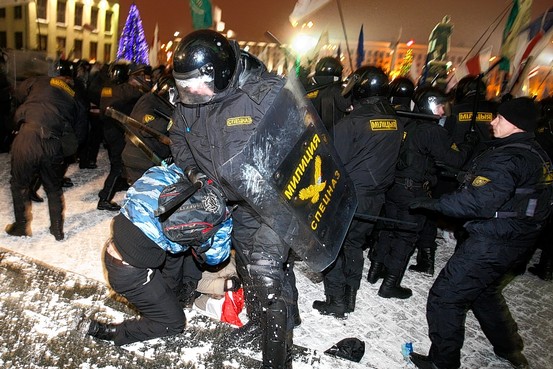Police beat protesters as EU condemns vote
Protesters set up barricades in the Belarus capital Minsk and clashes were reported in several cities on Tuesday night, after main opposition figure Svetlana Tikhanovskaya fled the country.
A BBC team in Minsk was attacked by police, who were accused by protesters of brutality.
Protests erupted hours after Belarus leader Alexander Lukashenko was awarded victory in Sunday’s presidential vote.
The EU said the election was “neither free nor fair”.
EU ‘considers sanctions’
Sweden’s foreign minister said EU foreign ministers would meet on Friday to discuss imposing sanctions on Belarus.
Mr Lukashenko won 80% of Sunday’s vote, according to election officials, but there were widespread allegations of vote-rigging and EU foreign policy chief Josep Borrell said Belarusians had shown “the desire for democratic change” in the election campaign.
When Ms Tikhanovskaya went to the electoral committee to complain about the results that gave her just 10% of the vote, she was detained for seven hours. By Tuesday morning she had left Belarus for neighbouring Lithuania.
Mr Borrell accused authorities of using “disproportionate and unacceptable violence causing at least one death and many injuries”.
Websites, which have been jammed in Belarus for days, were widely reported to be back online on Wednesday morning.
There have been numerous reports of police violence, with people seen being pulled out of cars on a third night of unrest. One protester has died and 200 others have been wounded, some seriously. Two thousand more have been detained.
The brutality of the crackdown has shocked observers. However, official newspaper Belarus Segodnya, said the protest “co-ordinators” had been detained, including one Minsk resident said to have organised the “mass disturbances” from a hotel room.
What happened at the scene?
Protesters gathered spontaneously on Tuesday night near Kammenaya Gorka metro station in central Minsk that quickly turned into a battleground of new clashes.
Police fired tear gas and stun grenades before fanning out across the street to push demonstrators back.
Some people fell while trying to flee, but were quickly picked up by others running behind. Police chased them into the yards of apartment blocks where many tried to hide.
When they caught up with fleeing protesters, officers surrounded them and beat them violently with batons. Residents watching from their windows booed and swore at officers, shouting at them to leave.
Someone even threw a wooden ladder at riot police who were beating a man under their window.
Earlier, our BBC team was also attacked by men dressed in black who appeared to be security forces.
“Take the camera away,” they shouted as they approached us. We showed them our government-issued accreditation, but one of the officers ripped our colleague’s card from around her neck, took her camera and attempted to break it.
When we demanded the accreditation document be returned, one of them lashed out with his baton at us and our remaining camera. Luckily, none of the team was badly hurt and the camera remained intact.
Several other journalists in Minsk also reported harassment and intimidation by security forces on Tuesday night.

Opposition website, Tut, said journalists were detained in the cities of Brest and Grodno, as well as in the capital.
Many had their equipment broken or confiscated. Tut.by said its own reporter and cameraman were targeted.
Mr Lukashenko, 65, who has ruled the former Soviet country since 1994, has described opposition supporters as “sheep” controlled from abroad.
There were some reports of workers going on strike but state media said it was fake news.
What has happened to the opposition?
Svetlana Tikhanovskaya galvanised the opposition, attracting big rallies ahead of the vote.
The 37-year-old former teacher was a stay-at-home mother until she entered the race after her husband was arrested and blocked from registering for the vote.
She was one of three women who pooled their resources to spearhead the opposition. Veronika Tsepkalo fled Belarus on the day of the vote and Maria Kolesnikova remains in Belarus.
According to her campaign partner, Ms Tikhanovskaya had been escorted from the country by the authorities as part of a deal to allow the release of her campaign manager, Maria Moroz, who was arrested on Friday evening.
After she had arrived in Lithuania a video appeared online in which she adressed supporters (in Russian), stating that she had overestimated her own strength.
“I thought that this campaign had really steeled me and given me so much strength that I could cope with anything,” she said. “But I guess I’m still the same weak woman that I was.”
“Not one life is worth what is happening now,” she added. “Children are the most important things in our lives.” Ms Tikhanovskaya had sent her children to Lithuania for safety before the election.
What’s the context?
In the last presidential election in 2015, Mr Lukashenko was declared winner with 83.5% of the vote. There were no serious challengers and election observers reported problems in the counting and tabulation of votes.
Anger towards Mr Lukashenko’s government this time has been in part fuelled by its response to coronavirus.
The president has downplayed the outbreak, advising citizens to drink vodka and use saunas to fight the disease.
Belarus, which has a population of 9.5 million, has reported nearly 70,000 cases and almost 600 deaths.



